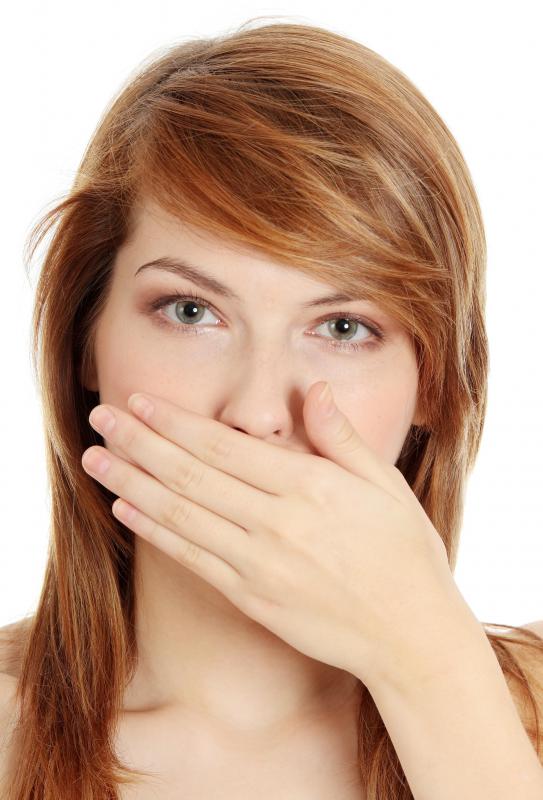At BeautyAnswered, we're committed to delivering accurate, trustworthy information. Our expert-authored content is rigorously fact-checked and sourced from credible authorities. Discover how we uphold the highest standards in providing you with reliable knowledge.
What Is an Antibiotic Mouthwash?
There are several different kinds of mouthwash used for the purposes of preventing cavities, preventing gum disease, killing germs, and finally treating diseases of the mouth, teeth, and gums. An antibiotic mouthwash is not the same thing as an antiseptic mouthwash, which is what most people buy over-the-counter to help prevent cavities and control bad breath. Instead, it is an oral solution that contains an antibiotic medication and is usually available only by prescription.
The most common active ingredient in antibiotic mouthwash is the drug chlorhexidine, a chemical antimicrobial typically used to treat gum disease. A dentist may prescribe a chlorhexidine gluconate oral rinse when signs of gum disease are present. These signs include inflammation, redness and bleeding of the gums. Other uses for antibiotic mouthwash include prevention of tooth decay and infection following oral surgery. This type of mouthwash may also be prescribed to treat ulcers or sores in the mouth.

In antiseptic mouthwash, the ingredients that do so are typically hydrogen peroxide, alcohol, and thymol and are not as strong as the class of medications contained in prescription antibiotic mouthwash. Even so, both mouthwashes have the same effect — killing germs on the surface of living tissue. Unlike a prescription oral antibiotic, which is ingested and works from inside the body, antibiotic mouthwashes are not designed to be swallowed and therefore work only from the surface of the tissue. Swallowing mouthwash is never recommended and can be toxic, especially to children.

In addition to antibiotic and antiseptic mouthwash, another type of mouthwash available by prescription is a type of anti-fungal rinse. Anti-fungal mouthwash may be prescribed to treat a persistent case of thrush, which can sometimes occur as the result of taking oral antibiotics. Always discuss any type of medication used or taken, including antibiotic mouthwash, with your doctor or dentist before he or she prescribes new medication. Read warning labels and follow directions for any prescription mouthwash. Talk to your doctor or dentist if you have concerns about potential side effects, including staining of the teeth, excess calculus formation, and temporary loss or change of taste.

There are many situations and conditions for which an antibiotic mouthwash may be prescribed, but for the prevention of gum disease, cavities, and bad breath, an antiseptic mouthwash along with regular brushing and flossing is sufficient for most people. Be cautious of accidental ingestion and never intentionally swallow mouthwash. Any time an intentional amount of mouthwash is ingested, especially in children, call poison control or a doctor immediately.
AS FEATURED ON:
AS FEATURED ON:















Discussion Comments
I have always had a very dry mouth. After complaining about this for awhile, my dentist said that this is caused by a lack of saliva.
For some reason, my mouth doesn't produce as much saliva as most people, and as a result, my mouth stays very dry.
If this isn't treated, it can lead to other problems like gum disease. I use an antibiotic mouthwash every day just like most people use a regular mouthwash.
This really doesn't help me produce any more saliva, it just helps keep my mouth and gums healthy to prevent problems like gum disease.
I wasn't even aware there was such a thing as an antibiotic mouthwash until I was prescribed one after I had my wisdom teeth removed.
The oral surgeon who removed my teeth said he usually did this as a precaution, and to make sure my mouth did not get infected after the surgery.
I only received one small bottle of this that I used until it was gone. I never had any problems and have never had to use an antibiotic mouthwash for anything since then.
I can see where something like this would be helpful in situations like this. The surgeon said a mouthwash like this is also used for people who have a physical or medical condition where they cannot brush their teeth by themselves on a regular basis.
For many years we didn't have any dental insurance and my husband went several years without going to the dentist. When he finally went, he had gum disease.
Even though he had been brushing his teeth, he did not floss and because he had gone so many years without removing the plaque from his teeth, he needed some special treatment.
His dentist prescribed an antibiotic mouthwash for him to use every time he brushed his teeth. In addition to the mouthwash, he was also given a topical antibiotic to put on his gums.
After using both of these products consistently for several weeks, his gums looked much healthier. Once the gum disease was cleared up, he began using an antiseptic mouthwash instead of the antibiotic one.
Post your comments